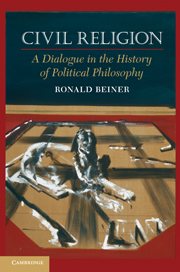Book contents
- Frontmatter
- Contents
- Preface and Acknowledgments
- Introduction
- Part I Machiavelli, Hobbes, Rousseau
- 1 Rousseau's Problem
- 2 The Machiavellian Solution
- 3 Moses and Mohammed as Founder–Princes or Legislators
- 4 Refounding and “Filiacide”
- 5 The Hobbesian Solution
- 6 Behemoth
- 7 Geneva Manuscript
- 8 Social Contract
- Part II Responses to (and Partial Incorporations of) Civil Religion within the Liberal Tradition
- Part III Theocratic Responses to Liberalism
- Part IV Postmodern “Theism”
- Conclusion
- Index
- References
5 - The Hobbesian Solution
Judaicization of Christianity
Published online by Cambridge University Press: 05 June 2012
- Frontmatter
- Contents
- Preface and Acknowledgments
- Introduction
- Part I Machiavelli, Hobbes, Rousseau
- 1 Rousseau's Problem
- 2 The Machiavellian Solution
- 3 Moses and Mohammed as Founder–Princes or Legislators
- 4 Refounding and “Filiacide”
- 5 The Hobbesian Solution
- 6 Behemoth
- 7 Geneva Manuscript
- 8 Social Contract
- Part II Responses to (and Partial Incorporations of) Civil Religion within the Liberal Tradition
- Part III Theocratic Responses to Liberalism
- Part IV Postmodern “Theism”
- Conclusion
- Index
- References
Summary
How we can have peace while this is our religion, I cannot tell.
– Thomas HobbesRousseau himself draws attention to Hobbes's contribution as a theorist of civil religion by addressing Hobbes's position in his own account of civil religion. Rousseau writes,
Of all Christian authors, the philosopher Hobbes is the only one who correctly saw the evil and the remedy, who dared to propose the reunification of the two heads of the eagle, and the complete return to political unity, without which no State or government will ever be well constituted. But he ought to have seen that the dominating spirit of Christianity was incompatible with his system, and that the interest of the priest would always be stronger than that of the State. It is not so much what is horrible and false in his political theory as what is correct and true that has made it odious.
In a footnote elaborating on the last sentence of this quotation, Rousseau rebukes Grotius for having denied the Hobbesian principle that “it is the duty of each private individual to follow the religion approved in his homeland by the public authorities, if not adopting it in his heart, at least in professing it and submitting to it obediently.” My purpose in this chapter is to provide a sufficient elaboration of Hobbes's civil-religion doctrine to clarify what Rousseau (in this highly compressed passage) sees as true in Hobbes, and whether Hobbes is in fact subject to the criticism Rousseau presents concerning the Hobbesian doctrine.
The idea of Hobbes as a civil-religion theorist is hardly a novel suggestion. Certainly, all that Hobbes has to say on the subject of religion in De Cive and Leviathan gives one every impression that Hobbes is a theorist for whom the specifics of Christian doctrine count for very little, and for whom the imperatives of political authority count for almost everything (or rather, for whom the specifics of Christian doctrine matter insofar as they affect the fate of political authority). One's first impulse is to say that Hobbes's main purpose is to ensure maximum discretion for the sovereign in the determination of cultic requirements, and that it would be unwise to risk limiting this discretion by inquiring too closely into the desirable contents of a state religion. This is a true but insufficient response. It is insufficient because it fails to explain why Hobbes in fact devotes such monumental time and energy to problems of scriptural exegesis. The answer to this puzzle is that Hobbes came to the same insight grasped by Machiavelli before him and Rousseau after him, namely that genuinely Christian aspirations are so radically otherworldly that they subvert the authority of temporal power; and so Hobbes, in common with Machiavelli and Rousseau, must search for a way to neutralize the threat to the requirements of secular politics posed by Christianity. To summarize the civil-religion strategies of these three political philosophers, one could say the following: Rousseau's “solution” is to offer a minimalist civic creed that abstracts as much as possible from specifically Christian content – although this is not really a solution to the paradoxes and contradictions that Rousseau brilliantly highlights in his civil-religion chapter; Machiavelli's solution is to paganize Christianity through the heroic figure of Cesare Borgia, who embodies the will to “draw the steel from the wound” by undoing the political power of the papacy; and Hobbes's solution is to “Judaicize” Christianity by reinterpreting Christian Scripture according to a pre-Christian understanding of a political messiah.
- Type
- Chapter
- Information
- Civil ReligionA Dialogue in the History of Political Philosophy, pp. 46 - 60Publisher: Cambridge University PressPrint publication year: 2010



